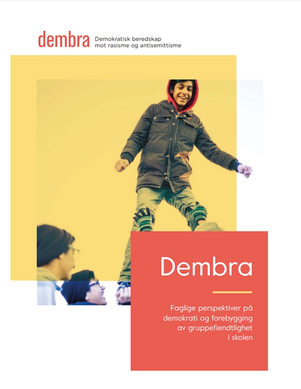Dembra's Principles for Prevention
What helps prevent anti-Semitism, racism and anti-democratic ideas? How can teachers and schools do more to create an inclusive school environment? Dembra is the response to research-based answers to these two questions, summed up in five principles:
1. Inclusion and participation
Exclusionary attitudes and prejudice towards the “other” create a sense of identity and affinity with the “we” group. This means that we must build welcoming and inclusive communities that are not based on negative perceptions of the “other”. Democracy, student participation and inclusion are therefore important instruments when trying to prevent marginalization, discrimination and harassment.
2. Knowledge, critical thinking and curiosity
Prejudice and group-based hostility are linked to both historical and current perceptions in society. Knowledge of these perceptions is necessary to be able to interpret, prevent and deal with attitudes in schools where they manifest themselves. Curiosity is an important attribute that provides motivation for acquiring new knowledge when encountering new and perhaps unknown phenomena. Exclusionary attitudes and extremist ideologies are based on stereotypes and on a one-sided, often conspiratorial, worldview. Critical thinking and reflection challenges and nuances rigid mindsets. The fact that knowledge, curiosity and critical thinking are important preventive tools shows that the core activity of schools – enabling children to attain and master fundamental skills – is preventive in itself.
3. Intercultural competence (diversity competence)
Students and teachers need to be able to interpret, communicate and act in diverse contexts. When it comes to prevention, the primary goal is not to learn about the differences between groups. Rather it is to learn how to identify, accept and reflect on differences as well as similarities across, but also within, different groups.
4. Ownership and institutionalization
The teachers and school leadership must themselves identify the school's needs based on their experiences, own practices and school environment. Ownership and motivation are key to making progress, and schools must take responsibility for the measures they take. Inclusion in the school's plans, a long-term approach and institutionalization throughout the school are key factors for making advances in terms of prevention. Literature, methodology and teaching plans that are perceived as relevant and topical trigger motivation and a desire to try things out.
5. The school as a whole
The school leadership's and the teachers' work on prevention will have the greatest effect if it is allowed to permeate the school at all levels, from individual knowledge, skills and attitudes to classroom teaching, school management and the school's partners such as parents and the local community.
Further reading
Lenz, Claudia, Nustad, Peder (2016). Teoretisk og faglig forankring av Dembra. I: Lenz, C., Nustad, P. & Geissert, B. (red.). Dembra. Faglige perspektiver på demokrati og forebygging av gruppefiendtlighet i skolen.

